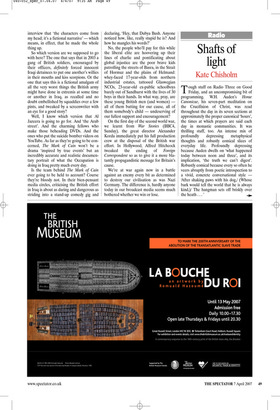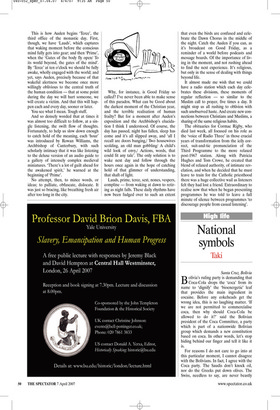Shafts of light
Kate Chisholm
Tough stuff on Radio Three on Good Friday, and an uncompromising bit of programming. W.H. Auden’s Horae Canonicae, his seven-part meditation on the Crucifixion of Christ, was read throughout the day in its seven sections at approximately the proper canonical ‘hours’, the times at which prayers are said each day in monastic communities. It was thrilling stuff, too. An intense mix of profoundly depressing metaphysical thoughts and robustly comical slices of everyday life. Profoundly depressing because Auden dwells on ‘what happened today between noon and three’, and its implication, ‘the truth we can’t digest’. Robustly comical because every so often he veers abruptly from poetic introspection to a vivid, concrete conversational style — ‘After shaking paws with his dog,/ (Whose bark would tell the world that he is always kind,)/ The hangman sets off briskly over the heath.. . ’ This is how Auden begins ‘Terce’, the third office of the monastic day. First, though, we have ‘Lauds’, which captures that waking moment before the conscious mind fully gets into gear; and then ‘Prime’, when the ‘Gates of the body fly open/ To its world beyond, the gates of the mind’. By ‘Terce’ at ten o’clock we should be fully awake, wholly engaged with the world; and yet, says Auden, precisely because of that wakeful alertness we become once more willingly oblivious to the central truth of the human condition — that at some point during the day we will hurt someone, we will create a victim. And that this will happen each and every day, sooner or later.
You see what I mean. Tough stuff.
And so densely worded that at times it was almost too difficult to follow, at a single listening, the swift flow of thoughts. Fortunately, to help us slow down enough to catch hold of the meaning, each ‘hour’ was introduced by Rowan Williams, the Archbishop of Canterbury, with such scholarly intimacy that it was like listening to the deluxe version of an audio guide to a gallery of intensely complex medieval miniatures. ‘There’s a lot of guilt ahead for the awakened spirit,’ he warned at the beginning of ‘Prime’.
No attempt, then, to mince words, or ideas; to palliate, obfuscate, dislocate. It was just so bracing, like breathing fresh air after too long in the city. Why, for instance, is Good Friday so called? I’ve never been able to make sense of this paradox. What can be Good about the darkest moment of the Christian year, and the terrible realisation of human frailty? But for a moment after Auden’s exposition and the Archbishop’s elucidation I think I understood. Of course, the day has passed, night has fallen, sleep has come and it’s all slipped away, and ‘all I recall are doors banging,/ Two housewives scolding, an old man gobbling/ A child’s wild look of envy,/ Actions, words, that could fit any tale’. The only solution is to wake next day and follow through the hours once again in the hope of catching hold of that glimmer of understanding, that shaft of light.
Lauds, prime, terce, sext, nones, vespers, compline — from waking at dawn to retiring as night falls. These daily rhythms have now been fudged over to such an extent that even the birds are confused and celebrate the Dawn Chorus in the middle of the night. Catch the Auden if you can, as it’s broadcast on Good Friday, as a reminder of a world before podcasts and message boards. Of the importance of living in the moment, and not rushing ahead to find the next experience. It’s religious, but only in the sense of dealing with things beyond life.
It almost made me wish that we could have a radio station which each day celebrates these divisions, these moments of regular reflection — so similar to the Muslim call to prayer, five times a day. It might stop us all rushing to oblivion with such unobserved haste. And create new connections between Christians and Muslims, a sharing of the same religious habits.
The obituaries for Cormac Rigby, who died last week, all focused on his role as the ‘voice of Radio Three’ in those crucial years of transformation from the icily correct, suit-and-tie pronunciation of the Third Programme to the more relaxed post-1967 station. Along with Patricia Hughes and Tom Crowe, he created that blend of relaxed authority, of intimate revelation, and when he decided that he must leave to train for the Catholic priesthood there was a huge collective wail as listeners felt they had lost a friend. Extraordinary to realise now that when he began presenting programmes he was told to leave a full minute of silence between programmes ‘to discourage people from casual listening’.



































































 Previous page
Previous page